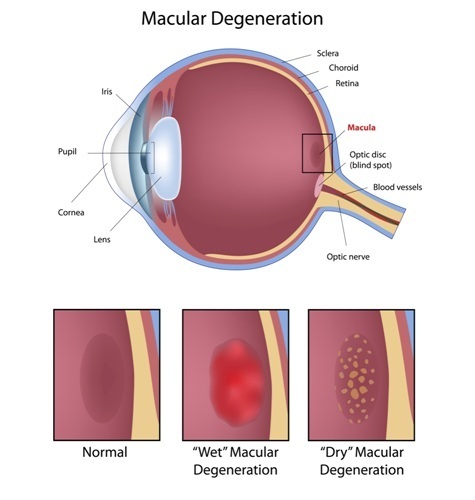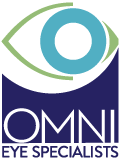What is Macular Degeneration?
2/6/24
Keeping your eyes healthy is a must, no matter your age. But you may develop certain eye conditions, like macular degeneration, as you age.
Macular degeneration is a prevalent eye condition. It's one of the leading causes of vision loss in adults over 50. Macular degeneration is usually caused by aging.
Because of this, you may also hear it called age-related macular degeneration or AMD. Age-related macular degeneration can cause significant vision loss, although it rarely leads to total blindness. It can, however, significantly impair your vision by affecting your central vision.
Awareness, regular eye exams, and a healthy lifestyle are the best ways to prevent significant vision loss from age-related macular degeneration. Keep reading to learn more about macular degeneration and how it affects your vision.
What is Age-Related Macular Degeneration?
 Age-related macular degeneration occurs when the macula, which is the retina's center, degenerates. The retina is the membrane that lines the back of the eye and contains photoreceptor cells that transmit light into impulses sent to your brain.
Age-related macular degeneration occurs when the macula, which is the retina's center, degenerates. The retina is the membrane that lines the back of the eye and contains photoreceptor cells that transmit light into impulses sent to your brain.
These impulses are then processed as images. When the retina's center becomes damaged, it kills the cells there, and you lose some of your central vision.
There are two kinds of age-related macular degeneration: dry and wet.
Dry Age-Related Macular Degeneration
Dry age-related macular degeneration is the most common form of age-related macular degeneration. The dry form occurs when the macula becomes thinner due to a buildup of drusen.
Drusen are yellowish deposits that develop under the macula. The older you are, the more drusen you're likely to have.
Dry age-related macular degeneration usually develops slowly over a long period and often goes unnoticed in the early stages.
Wet Age-Related Macular Degeneration
Wet age-related macular degeneration is rarer than the other form. However, it usually develops more quickly.
It occurs when the blood vessels that supply the macula with oxygen grow abnormally. These abnormal blood vessels swell and leak, damaging the macula by forming scar tissue.
What are the Symptoms of Age-Related Macular Degeneration?
The symptoms of age-related macular degeneration tend to appear very slowly over time, particularly with the dry form of the eye condition. However, once symptoms appear, they are irreversible. All vision loss due to age-related macular degeneration is permanent.
These are the symptoms of age-related macular degeneration in the order they tend to appear:
- Straight lines appear wavy
- Blurry central vision
- Blind spots in central vision
- Loss of central vision
The best thing you can do to keep your eyes healthy is to have regular eye exams. Having eye exams with your ophthalmologist at OMNI Eye Specialists will ensure that any signs of age-related macular degeneration are caught and spotted early.
You may not notice any visual symptoms, but an eye exam can help your eye doctor see the early signs of damage to the macula.
Learn More About Age-Related Macular Degeneration
Risk Factors for Age-Related Macular Degeneration
You need to be aware if you're at risk for age-related macular degeneration. Patients at risk for age-related macular degeneration and other eye conditions should have eye exams regularly so any issues can be spotted and diagnosed early.
The main risk factors for age-related macular degeneration include:
- Being over 50
- Having high cholesterol
- Tobacco use
- Having high blood pressure
You're at high risk for age-related macular degeneration if you exhibit multiple risk factors. If you're at high risk, you should take extra care to have eye exams regularly and look out for the earliest symptoms of age-related macular degeneration.
In some cases, you may also be able to lower your risk for age-related macular degeneration.
Prevention and Treatment
 The best way to prevent vision loss due to age-related macular degeneration is to do what you can to lower your risk for the eye condition and have eye exams regularly. Some risk factors for age-related macular degeneration are out of your control, but some aren't.
The best way to prevent vision loss due to age-related macular degeneration is to do what you can to lower your risk for the eye condition and have eye exams regularly. Some risk factors for age-related macular degeneration are out of your control, but some aren't.
Leading a healthy lifestyle is the best way to lower your risk for age-related macular degeneration and other eye conditions. Some of the most significant risks for age-related macular degeneration are high cholesterol and high blood pressure.
Staying fit and eating a healthy diet can help maintain cholesterol and blood pressure. A diet high in saturated fats is linked to higher cholesterol and a higher risk of developing age-related macular degeneration.
However, even if you follow a healthy lifestyle, there's no guarantee that you won't develop age-related macular degeneration. But you can do your part to ensure you receive an early diagnosis if you have the condition.
After being diagnosed, your eye doctor at OMNI Eye Specialists can monitor its progress. Unfortunately, dry age-related macular degeneration has no treatment.
The eye condition usually progresses very slowly. Following a specific regimen of AREDS vitamins can also help slow its progression.
Your ophthalmologist may prescribe these vitamins if you've been diagnosed with dry age-related macular degeneration. An AREDS vitamin regimen may also help prevent dry age-related macular degeneration from turning into the wet form of the eye condition.
Although no treatments are available for dry age-related macular degeneration, there are ways to treat the wet form. Treatment will not reverse any damage already done to the macula, but it can slow further damage.
The most common treatment for wet age-related macular degeneration is anti-VEGF injections. Anti-VEGF injections use a medication that inhibits blood vessel growth, lowering the number of abnormal blood vessels that can become swollen and leak fluids into the retina.
It's essential to have age-related macular degeneration diagnosed and monitored, whether it's the dry or wet form of the eye condition. Take the next steps towards keeping your age-related macular degeneration in check by requesting an appointment at OMNI Eye Specialists in Baltimore, Rosedale, Glen Burnie, Catonsville, and Parkville, MD, now!



